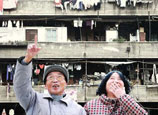
The English website of Guizhou’s “Sunshine Project”, an innovative model that brings the rehabilitating drug users back on right track, made official debut on Sunday, with a hope to better expand China’s experience in battling against drug abuse in the world.
The website named “A New Drug Rehabilitation Model in China – Sunshine Project in Guizhou” is constructed by People’s Daily Online under the authorization of Guizhou Narcotic Control Commission.
"Geographically, Guizhou is near the 'Golden Triangle', main illicit opium-producing area in Asia. Affected by rampant illegal drug trade in the world and domestic factors, Guizhou is confronted with a grim environment on the work of narcotic control in recent years," said Cui Yadong, director of Guizhou Narcotic Control Commission, at a symposium held to introduce the "Sunshine Project" and announce the launch of the website in Beijing Sunday.
"Narcotic control is an international challenge. Through the promotion of the English website, I hope the ‘Sunshine Project’ could win worldwide support,” Cui added.
"As media, People’s Daily Online plays a vital role in supporting the cause of drug control. I hope the English website show the whole world a vivid picture on how the 'Sunshine Project’ works and presents the unremitting efforts China has paid in drug control,” Cui told People’s Daily Online.
The English website of the "Sunshine Project" has published contents of more than 300,000 words offering rich information on latest news of the "Sunshine Project", policies and regulations related to drug control, current work on drug control in China, theories and thoughts on innovative way of controlling drug, media focus on the "Sunshine Project", the chronicles of key drug-control events in Guizhou and knowledge for drug control.
The "Sunshine Project" was initiated in 2006. Different from the traditional approach that mainly relies on mandatory drug treatment, the “Sunshine Project” emphasizes the employment of rehabilitating drug users. With the help of enterprises taking part in the "Sunshine Project", former drug takers get job, have income, regain confidence and reintegrate into society.
"The 'Sunshine Project' helps me shake off the thinking that I was the burden of society,” a representative of rehabilitated employees said at the symposium.
"The 'Sunshine Project' is a significant innovation. Most importantly, it makes outstanding contribution to the work of preventing drug-taking, a very complex part in the process of drug rehabilitation," said Yu’an, professor of the School of Public Policy and Management, Tsinghua University.
The Sunshine Project has achieved fruitful outcomes. The rates of drug-crimes and HIV infection among drug users have seen impressive decline in Guizhou and the relapse rates are far lower than the national averages. By the end of 2012, around 23,000 rehabilitated employees have been settled down in 137 "Sunshine Enterprises" in Guizhou.
Guizhou’s innovative way of drug rehabilitation gains the attention and support from the national level. China National Narcotic Control Commission decided to roll out the experience of the "Sunshine Project" nationwide in a meeting held in 2011.

















 China's Chongqing issues orange-coded alert of heat
China's Chongqing issues orange-coded alert of heat


![]()
